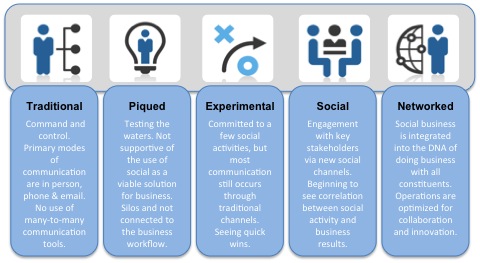By Rachel Happe, Co-founder of The Community Roundtable
Over the last few years, as social business and networked communications environments have become more pervasive, executives increasingly became pockets of inertia due to their more traditional modes of communicating and managing. But because of their influence, that has a dampening effect on organizations and prevents them from making the next leap in progress and innovation In order for organizations to move forward effectively with social business they need educated and engaged social executives leading the way.
One of our roles at The Community Roundtable is to advocate for social business and community strategists and one of the more powerful ways we advocate is to provide the information and tools to help people succeed. In that spirit, we compiled The Social Executive research in order to explore how executives connected business strategy to social approaches, how they adopted social approaches themselves and most importantly to provide successful coaching approaches and tools for those working to make social business initiatives successful.
A big part of the research was identifying and documenting the specific challenges executives face and the ways in which they learn. The picture of executives that emerged explains a lot about why it is so difficult for them to change. They are constantly traveling, overloaded with information, booked solid and have very few trusted sources of information on social business trends. As an added challenge they are primarily experiential learners. What this means is that much of the approach we see being taken to engage executives is all wrong because it starts with giving them research and business cases – things that overwhelm them with more information, take a long time to digest, are not necessarily trusted and are not experiential. We tend to throw facts at executives before they even care and fall into the trap of giving them too much, too soon.
I’m excited to be presenting the consolidated findings from this research at JiveWorld, which will include:
- Why executive adoption matters
- Why social approaches matter strategically to executives
- How social approaches help executives personally
- The executive adoption journey
- A case study
One of the most valuable outputs of the research is the definition of the stages of adoption and the trigger points that move an executive from one stage to the next – trigger points that with a bit of work can be orchestrated and used to match coaching techniques with where a specific individual is on their journey.
If you are working to help your executives learn how to effectively use social tools and approaches, you can find out more by:
- Joining me at JiveWorld on Wednesday, October 22nd at 10:30 as well as Nikki Bussard and Benjamin Taub on Thursday for a case study.
- Reading the UBM case study from the research and looking through our initial Social Executive presentation.
- Finding out more about The Community Roundtable’s advisory services, which include custom presentations, executive assessments and coaching.
- Letting us know if you are interested in our Social Executive Toolkit – a package of research, curated content, frameworks and templates to give you the tools to effectively coach executives – coming in mid-October.

